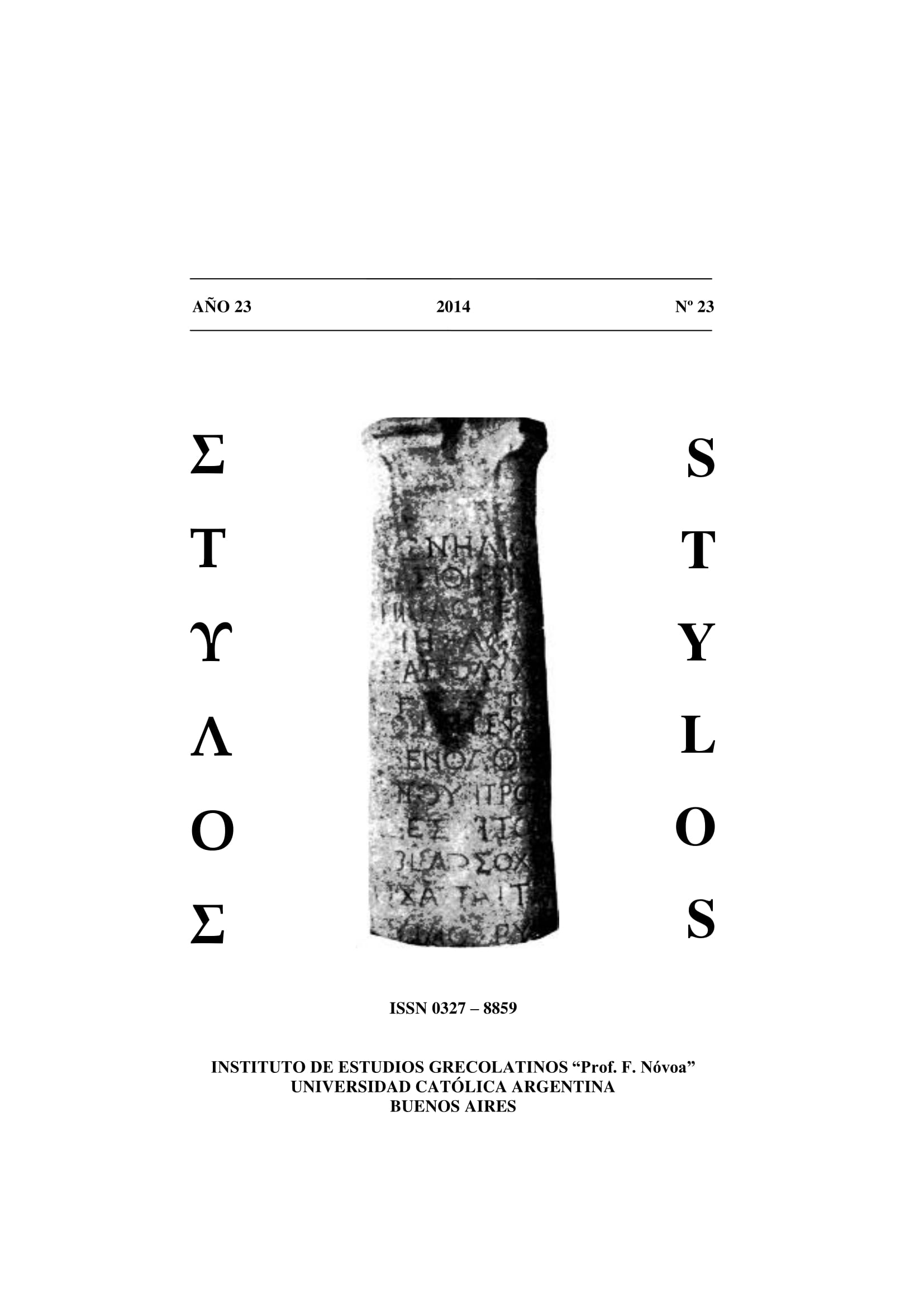LA CONSIDERACIÓN DE LO GRIEGO EN EL SATYRICON DE PETRONIO: ¿UN CASO DE FILOHELENISMO?
Keywords:
Ethnography – philohelenism – Petronius – NeroAbstract
The cruelty, the prejudice and the stereotypes were common in the view Romans had on other gentes. In the particular case of Greeks, Romans had an ambivalent consideration of them: on the one hand, they admired its writers, philosophers, and artists in general, but, for other, they disregard the rest of the Greeks. Romans distinguished between the classical Greece and its heredity and his subiecti, the contemporary Greeks. Petronius’ Satyricon, although it is not an exception in the traditional Roman xenophoby, presents a singularity in regard to the Greeks that take apart from most of the Latin writers. The cause of this special feature perhaps is the philohelenism of Nero’s court, where Petronius was the elengatiae arbiter.Downloads
References
EDICIONES Y COMENTARIOS
HABERMEHL, P. Petronius: Satyrica 79-141. Ein philologisch-literarischer Kommentar. Band 1: Sat. 79-110, Berlin and New York: De Gruyter, 2006.
MÜLLER, K. Petronius Satyricon Reliquiae, Stuttgart: Teubner, 1954.
SCHMELING, G. A Commentary on the Satyrica of Petronius, Oxford-New York: Oxford University Press, 2011.
VANNINI, G. Petronii Arbitri “Satyricon” 100-115. Edizione critica e commento, Berlin and New York: De Gruyter, 2010.
ESTUDIOS CRÍTICOS
BALSDON, J. Romans and Aliens, London: Duckworth, 1979.
BECK, R. “Eumolpus poeta, Eumolpus fabulator: A Study of Characterization in the Satyricon”, Phoenix, 1979; 33 (3): 239-253.
BOHAK, G. “Ethnic Portraits in Greco-Roman Literature”, 207-236 En Gruen, E. (ed.), Cultural Borrowings and Ethnic Appropiations in Antiquity, Stuttgart: Franz Steiner Verlag, 2005.
BURNS, T. S. Rome and the Barbarians, 100 B.C.-A.D.400, Baltimore and London: The Johns Hopkins University Press, 2003.
CARMIGNANI, M. “Petronii curiosa felicitas: la función de las citas en el discurso de Eumolpo (Sat. 118)”, Auster, 2010; 15: 37-46.
CARMIGNANI, M. “Poeta vesanus, recitator acerbus: Die auf Horaz basierende Karikierung des Eumolpus in Petronius, sat. 118”, RhM, 2013; 156 (1): 27-46.
CHAMPLIN, E. Nero, Cambridge, Massachusetts: Harvard University Press, 20032.
DAUGE, Y. Le barbare. Recherches sur la conception romane de la barbarie, Paris [s.n.] 1981.
DENCH, E. “Ethnography and History”, 493-503 En: Marincola, J. A Companion to Greek and Roman Historiography, Malden: Blackwell, 2007.
GRIFFIN, M. Nero: The End of a Dinasty, London: Batsford, 1984.
GRUEN, E. Rethinking the Other in Antiquity, Princeton: Princeton University Press, 2011.
HARTOG, F. El espejo de Heródoto. Ensayo sobre la representación del otro, Buenos Aires: Fondo de Cultura Económica, 2003.
ISAAC, B. The Invention of Racism in Classical Antiquity, Princeton: Princeton University Press, 2004.
KENNEDY, G. “Encolpius and Agamemnon in Petronius”, AJPh, 1978; 99: 171-178.
LABATE, M. “Eumolpo e gli altri, ovvero lo spazio della poesia”, MD, 1995; 34: 153-175.
MARBACH, A. Wortbildung, Wortwahl und Wortbedeutung als Mittel der Charakterzeichnung bei Petron, Diss. Gieβen, [s.l.][s.n.], 1931.
SADDINGTON, D. B. “Race relations in the early Roman Empire”, ANRW II, 32 (3): 112-137.
SETAIOLI, A. Arbitri Nugae: Petronius’ Short Poems in the Satyrica, Frankfurt am Main: Peter Lang, 2011.
SULLIVAN, J. P. “Court Politics and Petronius”, 153-179 En Sullivan, J. P. Literature and Politics in the Age of Nero, Ithaca: Cornell University Press, 1985.
SULLIVAN, J. P. “Petronius’ Satyricon and its Neronian Context”, ANRW 1985a; 32 (3): 1666-1686.
SYED, Y. “Roman and Others”, 360-371 En Harrison, S. A Companion to Latin Literature, Malden: Blackwell, 2005.
THOMAS, F. Lands and Peoples in Roman Poetry. The Ethnographical Tradition, Cambridge: Cambridge University Press, 1982.
TOYNBEE, J. Death and Burial in the Roman World, Ithaca: Cornell University Press, 1971.
VEYNE, P. “Vie de Trimalcion”, Annales (ESC), 1961; 16: 213-247.
WALSH, P. G. The Roman Novel. The Satyricon of Petronius and the Metamorphoses of Apuleius, Cambridge: Cambridge University Press, 1970.
INSTRUMENTA
L&S= LEWIS, CH. - SHORT, CH. A Latin Dictionary. Oxford, Oxford Clarendon Press, 1879.
OCD= HORNBLOWER, S., A. SPAWFORTH (eds.) The Oxford Classical Dictionary, Oxford: Oxford University Press, 1996.
OLD= GLARE, P. G. W. (ed.) Oxford Latin Dictionary, Oxford: Oxford University Press, 1968-1982.
Downloads
Published
How to Cite
Issue
Section
License






